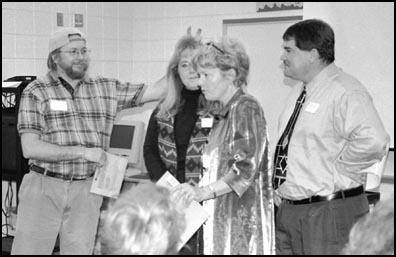 Parenting is not a skill developed over night, stressed Teri Graham, author and home communication specialist. "It took me 25 years to get it right," she said at a public meeting Thursday night.
Parenting is not a skill developed over night, stressed Teri Graham, author and home communication specialist. "It took me 25 years to get it right," she said at a public meeting Thursday night.Graham presented a workshop at the Paynesville Area Elementary School for the teachers Thursday afternoon. In the evening, she presented another program for interested parents.
Jay Thompson, Terry Skoglund, Teri Graham, and Todd Burlingame role played a family meeting during the workshop. Thompson and Skoglund were portraying children.
Graham said the goal of a parent is to work themselves out of a job. She emphasized that kids need routine, respect, and responsibility.
"Routine gives children a sense of security and order," Graham said. "As our families grow and mature, our rules and routines need to change. Our children don't want the same rules at 12 that they had at six years of age."
Graham urged parents with younger children to get them into the routine of homework by third grade. "They don't necessarily need to have homework, but make practice a priority. Get them into the routine of doing something for 20 to 30 minutes five days a week. They can be playing a game, doing puzzles, reading, or coloring. It is the parent's responsibility to create the homework habit, she added.
In her book, Kids on Task, Graham has a grading chart which helps some families develop a different view of letter grades. For example, some children are unable or unwilling to work for more than a satisfactory grade. While others are described as selective learners.
Her grading chart includes: (A) is an accomplished academic learner; (B) beyond basics; (C) is a competent learner; (D) desires more learning assistance; and (F) fails to make learning effort.
Parents often make two mistakes in their approach to raising children, according to Graham.
Graham said parents shouldn't be a marshmallow or a General Patton. "Parents don't want to pamper their children but they don't want to be too strict, either," Graham said. "It is important for parents to be consistent and persistent when disciplining their children." Pampered children have difficulty becoming responsibility takers. Graham offered this parenting tip: rarely do for your child on a routine basis what he can do for himself.
Another common parenting mistake is to attempt to make our children obey us by threatening punishment. Rather than work toward winning cooperation with respect, some parents use parental authority to coerce a child into obedience. "Treat your child with the same respect you would a coworker, friend, or neighbor," she added.
Graham stressed that it is important for children to be free to make mistakes at home. "We all learn together. We shouldn't be constantly correcting our children when they do or say something wrong," she explained.
Family communication
According to Graham, a simple way to help kids take responsibility and be part of the family team is to create a family message center. Place a notebook near the telephone. Begin to write your children notes and messages. Let them know where you are and when you're coming home—they'll soon learn to do the same for you. Taking time to communicate with the family helps kids take responsibility and builds family community.
"If you want your children to communicate with you, make sure you don't correct the spelling on their notes or correct them in public. It is all part of the growing process," Graham added.
Another way to communicate with your family is to hold a family meeting once a week to double check everybody's schedule, Graham said. Get your calendar and review what's going on. Discuss appointments, music lessons, games, and practice schedules. Talk about school supplies, lunch money, and transportation. "Kids love to know what is going on," she stressed. "It makes them feel important."
"The key is to make the meetings quick, to the point, and informational. Never use the meetings to scold or punish children," Graham said.
According to Graham, never let your children hear you say anything negative about a sibling. Whatever you say negative about your children, the child will become, she said.
"We, as parents, are responsible for the effort of preparing our children for young adulthood," Graham told the audience. "We have no power over the outcome. Children will make choices. Some we will approve of while others we won't. Children need the freedom to make mistakes and a home in which to learn how to make better decisions."
Graham added that parents should make it their goal to encourage your children with a warm greeting, a smile, and lots of hugs each day.
Parents need to be a team, working together.
Graham stressed the need for com-munication in a home. Get organized, she said. Keep a calendar by the telephone or on the refrigerator so everybody knows where everybody is.